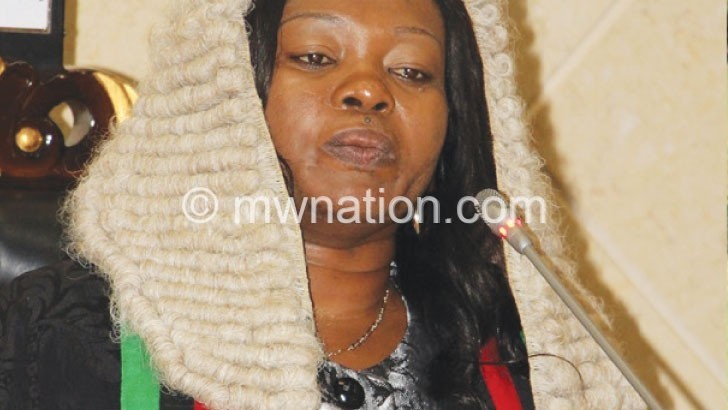Parliament moves on court ruling
Parliament has swiftly responded to an order of the High Court of Malawi sitting as the Constitutional Court by summoning its Business Committee to a meeting today to decide the way forward on modalities relating to fresh presidential election.
In an interview on Tuesday, assistant clerk of Parliament (protocol and public relations) Leonard Mengezi said the committee—which comprises the leadership of the House—will look into the recommendations made by the court, among others.

He said: “What the Business Committee will come up with will form the way forward and the nation will be communicated to.”
The Business Committee works out business to be tackled in the National Assembly. It is chaired by the Speaker and its membership includes Leader of the House, Leader of Opposition and leaders of political parties represented in Parliament.
In its ruling that nullified the May 21 2019 presidential election over widespread irregularities and ordered fresh election within 150 days, the Constitutional Court mandated Parliament to speed up the development of instruments to facilitate electoral reforms, including the law that the winner of presidential election garners a 50-plus-one majority.
The five-judge panel comprising Healey Potani, Mike Tembo, Ivy Kamanga, Redson Kapindu and Dingiswayo Madise, which unanimously upheld a petition to nullify the vote, also tasked Parliament to facilitate the reconstruction of Malawi Electoral Commission (MEC) which the court found to have been “grossly incompetent”.
Parliament was asked to amend the law within 21 days to accommodate run-offs in case no presidential candidate gets the 50+1 majority.
Further, the court asked Parliament’s Public Appointments Committee to inquire into the competence of the current MEC under Section 75 of the Constitution to ensure that the pending fresh election is conducted competently.
Parliament has also been asked to amend Section 75 of the Constitution to mention the appointing authority of the commission.
The court also directed that the concurrence of presidential and parliamentary elections should be preserved and that in the wake of the order for fresh elections, Parliament should facilitate extension of the tenure of the current crop of members of Parliament (MPs) beyond March 20 2024 when the House could have stood dissolved ahead of general elections.
In separate interviews on Tuesday, legal commentators said the court’s pronouncement on some of the recommendations to Parliament meant that they have become effective.
In a telephone interview, Sunduzwayo Madise, Dean of the Faculty of Law at Chancellor College—a constituent college of the University of Malawi, said the court’s recommendation meant Parliament should put up further legislation to effect that decision which has become effective upon pronouncement.
He said: “In other words, when you have no person attaining the 50-plus-one, there is need to determine who is going to participate in the runoff, the duration or if for example they can pick a running mate. So, these are the nitty-gritties Parliament will have to ensure that the decision is properly effected.”
In addition, Madise said in the case of such a re-run, the tenure of MPs will have to be extended to harmonise with the tenure of the forthcoming President.
While asking for more time to understand the interpretation, Malawi Law Society president Burton Mhango said the recommended adjustments should be made upon amendment of the Presidential and Parliamentary Elections Act (PPEA).
He said: “Otherwise, from what we heard on the radios, it looks like the court’s view is that such adjustments will have to be employed in the fresh elections ordered to be conducted after 150 days. This only makes sense when one considers the court’s directions on timelines.”
But Mhango said the challenge with the understanding is that Section 100 of the current PPEA says that after nullification of results, fresh elections are to be conducted “in accordance to this Act”.
He said: “This Act means the current framework and once an amendment is made, they become part of the Act.
In a separate telephone interview, professor of law at Chancellor College, Garton Kamchedzera, said the court has given direction to Parliament.
He said the recommended laws have to guide the fresh elections as the court saw that one of the reasons why they were challenges in the May 21 2019 Tripartite Elections was due to the elections management.
In an earlier interview, South Africa-based legal scholar Danwood Chirwa said the judges were courageous and revamped the Constitution as framers intended.
When asked for its reaction, Public Affairs Committee, which promoted the Electoral Reforms Bills that included the 50-plus-one provision that was rejected by Parliament in December 2017, hailed the recommendations on the elections management.
PAC executive secretary Robert Phiri said the decision was progressive and will act as a stepping stone for further advocacy for other electoral reforms.
He said: “We know the reforms will not solve all the problems but definitely they have the potential to deal with crucial issues Malawi has been debating since transition.”
In 2017, PAC presented a petition to the Speaker of Parliament and President Peter Mutharika to support the Electoral Reforms Bills to be tabled in Parliament which were apparently adulterated. The Electoral Reforms Bills that PAC advocated include an Amendment of Section 80 (2) of the Constitution and Section 96 (5) of the Presidential and Parliamentary Elections Act proposing a 50-plus-one majority in presidential elections and an amendment.





